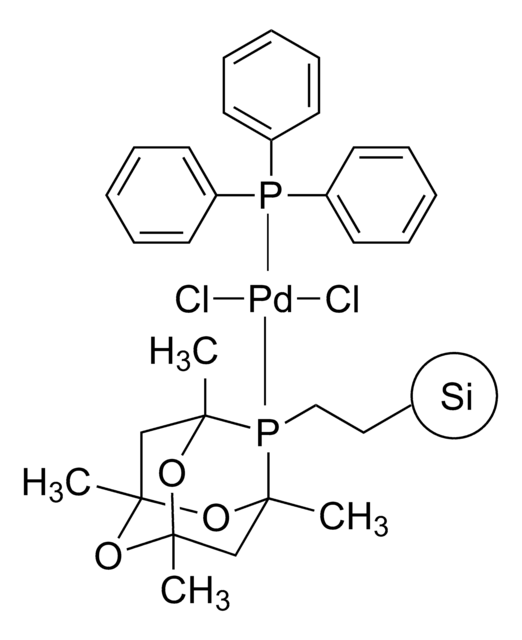644722
Pd EnCat® 40
extent of labeling: 0.4 mmol/g Pd loading
Synonyme(s) :
Palladium acetate microencapsulated in polyurea matrix
About This Item
Produits recommandés
Contient
0.37-0.44 mmol/g palladium
Niveau de qualité
Pertinence de la réaction
core: palladium
reagent type: catalyst
Capacité de réaction
reaction type: Buchwald-Hartwig Cross Coupling Reaction
reaction type: Heck Reaction
reaction type: Hiyama Coupling
reaction type: Negishi Coupling
reaction type: Sonogashira Coupling
reaction type: Stille Coupling
reaction type: Suzuki-Miyaura Coupling
Ampleur du marquage
0.4 mmol/g Pd loading
Description générale
Application
Caractéristiques et avantages
- low residual metal levels in crude product
- easy recovery of catalyst
- compatibility of immobilized metal with various ligands to effect C-C bond forming reactions
- safer and easier to handle than Pd/C for hydrogenation
- efficiency and economy gains through recovery and recycling
Autres remarques
Informations légales
Mention d'avertissement
Danger
Mentions de danger
Conseils de prudence
Classification des risques
Aquatic Chronic 3 - Eye Irrit. 2 - Flam. Sol. 2 - Repr. 1B - Skin Irrit. 2
Classe de danger pour l'eau (WGK)
WGK 3
Équipement de protection individuelle
dust mask type N95 (US), Eyeshields, Faceshields, Gloves, type P2 (EN 143) respirator cartridges
Faites votre choix parmi les versions les plus récentes :
Déjà en possession de ce produit ?
Retrouvez la documentation relative aux produits que vous avez récemment achetés dans la Bibliothèque de documents.
Contenu apparenté
Homogeneous palladium catalysts are widely utilized due to their versatility, reactivity and functional group tolerance.
Homogeneous palladium catalysts are widely utilized due to their versatility, reactivity and functional group tolerance.
Homogeneous palladium catalysts are widely utilized due to their versatility, reactivity and functional group tolerance.
Homogeneous palladium catalysts are widely utilized due to their versatility, reactivity and functional group tolerance.
Notre équipe de scientifiques dispose d'une expérience dans tous les secteurs de la recherche, notamment en sciences de la vie, science des matériaux, synthèse chimique, chromatographie, analyse et dans de nombreux autres domaines..
Contacter notre Service technique
![[Pd(OAc)2]3 reagent grade, 98%](/deepweb/assets/sigmaaldrich/product/structures/508/249/99a0ef2c-b77c-4d73-8ed9-0cca05b6b41f/640/99a0ef2c-b77c-4d73-8ed9-0cca05b6b41f.png)










